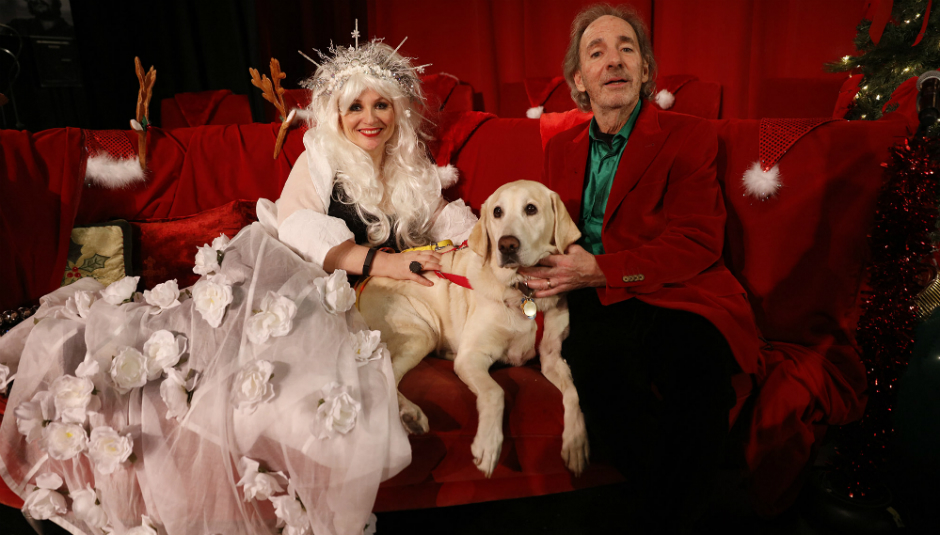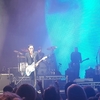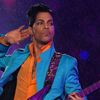“What number of times have you seen that episode?” In isolation, it’s an innocent question, but my stomach drops nonetheless. It is bad enough that I’m wearing a t-shirt with Radioactive Man on the front, with the words ‘Ze goggles do nothing’ printed across it, while sat next to Harry Shearer, the man who delivered that very line 21 years ago. It is worse that I am going to have to reveal to one of my biggest heroes – Mr. Burns, Ned Flanders, Principal Skinner, Rainier Wolfcastle and more – just how big a nerd I am when it comes to The Simpsons, the regular cast of which he has been a part since it began in 1989.
“You genuinely don’t want to know.”
“I do!”
The number of times I have seen “Last Exit to Springfield” is probably in three figures.
“Oh my god.”
Suddenly I am relieved that we are not having lunch to talk about The Simpsons. Harry and Judith Owen, the acclaimed singer-songwriter to whom he has been married since 1993, are in London to perform their charity show, Christmas Without Tears, at King’s Place on Thursday 8 December. We meet on Portobello Road for them to tell DiS exactly why it’s not your typical benefit gig.
“It’s up to us to maintain a couple of things,” explains Harry. “One is [the performers are] not just hired talent; in most cases, if not all cases, these are people that we know, so that helps a lot. Then the rambunctiousness of the second act, where Judith forces the audience to sing carols and whips them into miming “The 12 Days of Christmas” also separates it from the standard sort of staid charity concert.”
This is not a concert but nor is it pantomime, although audience participation is a large part of what the couple describe as a sing-along show. “I go to great lengths, as the producer of this thing, and we go to great lengths as the hosts, to still have it looking like our living room,” says Judith. “We’d dress the stage as if it’s a room with couches and chairs and throws and rugs, and there’s a huge tree in the background and presents everywhere. It should feel like the audience has been invited to someone’s living room and they’re all round the piano, that’s the point of it.”
The reason for this is that the show began as nothing of the sort. Its formative years were spent as parties with friends and colleagues at Harry and Judith’s home in LA to help her cope with low-grade depression and an anxiety order that meant she struggled at this time of year especially, as Harry begins to explain.
“Judith, being a woman of Welsh descent living in London, comes over to southern California and seems appalled by the fact that Christmas is warm and sunny out there. She needed to return to her roots, to get people to gather around a piano as if huddling against the grave darkness.
“So we called a few of our friends, who are musicians and comedy people, to come over and do a few little pieces, a song or a bit of material. And eat a lot of food.”
Judith continues: “It became a really wonderful thing, because it was a throwback to entertaining yourself by the piano. The actual act of entertaining each other is really quite special, a really amazing thing to do. So that’s really where it all came from and by the third or fourth year that we’d done this we had people calling us up to say “please can we come to your party?”“.
In 2005, just three or four years after its living-room beginnings, the show moved from the couple’s living room to the stage. A booker at the Walt Disney Concert Hall in LA had got wind of the parties and, though the couple were reluctant to follow the booker’s prompt at first, they were moved by the devastating effects of Hurricane Katrina to use the shows to raise money for New Orleans musicians (and yes, Harry is welcome back there despite Oh, Streetcar! – “worse things have happened in New Orleans, he reminds me).
Since then, it has become a global, annual event featuring an array of talent. Previous years have seen the likes of Christopher Guest and Michael McKean join in and Jane Lynch, Catherine O’Hara, John Michael Higgins, and Fred Willard are all either in or have been in the LA shows. The roll call for London this year includes Kipper Eldridge, Jacqui Dankworth, Charlie Wood, Nell Bryden, Doña Oxford, percussionist Pedro Segundo, cellist Gabriella Swallow, and Squeeze singer Chris Difford, as well as the comedian and writer Stephen Merchant.
“It’s down to people we love,” explains Judith when I ask how they decide whom to invite to perform. “People who are friends; it’s people you would invite to your home as a party guest.”
The idea of a Christmas without tears sounds quite comforting given the year we have had, and Harry and Judith agree that it seems especially important in 2016. Judith says: “It’s a horrible year on many levels: for Britain, for America, for everyone, for the world; the world’s a mess. The loss of so many great people. Wars...”
“A crappy Olympics,” adds Harry, who, incidentally, rejects the idea that Monty Burns has taken the White House. “Mr Burns is richer, Mr Burns actually has the money. Mr Burns is a lot less vain, there’s a lot less attention paid to his appearance. Burns did run for office in season two but he started at a sane level when he ran for governor of the state. But Trump just went right for the top.”
This year the London show is raising money for Copenhagen Youth Project Camden and Shelter. “[At Christmas] you’ve got people who are alone, lonely, ill,” says Judith. “People missing, people who aren’t around. And people living on the streets; if you’re in a hard place in life and struggling Christmas just makes it all the worse. It really does. So this is the antidote to it, but it’s reverent and it’s entirely irreverent. It’s always felt to me like [the show] should feel like the Christmas you wanted to have.
“You’re meant to leave with a smile on your face and like you’re in a shared experience. It’s a community thing.”
People with nowhere to go are very much a cause close to Judith’s heart; indeed it was an incident involving one such case that informed her most recent album, Somebody’s Child.
“It’s something the whole album is centred around,” she continues, “because all the songs are about seeing things that are important, that really do matter.
“A few Christmases ago I was in Manhattan shopping going towards Saks and when I turned on to Fifth Avenue there was this extremely beautiful girl, maybe 16, 17 years old. She had a Laura Mvula look to her with her shaved head, beatific smile, stunning. But she had no clothes and no shoes. There was snow on the ground, it was shocking weather, and she was wearing two black bin bags. And in between was the most beautiful yet shocking giant pregnant stomach. She was about to give birth and she was high on drugs, singing and screaming and dancing and twirling to the music in her head.
“It’s such a shocking thing to see because none of us want to be reminded of our fragility. And at some point it occurred to me that that was somebody’s child. I’m looking at somebody’s baby. We all start the same and anybody could end up that way. With the wrong start, the wrong home, with bad brain chemistry or depression. It’s luck; with any of those things that could have been me.
“So that’s why this year I felt like we should be raising money for homeless charities and we should be supporting, because I see in London it’s worse every year. It’s worse every year.”
Of course Harry is, to many fans, known as a musician himself: Derek Smalls, the bass player in Spinal Tap. I’ve always thought that musical comedy is the hardest to write, having to master two disciplines.
“I think whenever comedy involves another element, if you’re making fun of serious acting for example, doing a piss-take of a Shakespearean performance, you have to learn a different craft,” he explains. It’s the same thing with music, nothing is really funny about just crappy music. With something like Spinal Tap we’re still working hard to play it right, to make it sound credible that this band would have a career.
“A lot of people don’t necessarily think that way. [They think] ‘This’ll be funny’ and that’s the end of the conversation. They don’t think ‘How would this band have ever have got off the ground if they play that badly?’ So it depends on how much you want to examine those things and follow the logic of it. All of us really cared that it should be very believable that this band actually existed. Our desire was to fool the casual viewer, such as, let’s say Liam Gallagher [the Oasis frontman notoriously thought Tap were a real band].”
Audiences can look forward to a likely rendition of Spinal Tap’s “Christmas With the Devil” but don’t expect him to rely on his back catalogue. He says: “This is what separates this show from what we normally do. It’s not “these are my songs”. Everybody comes out and does something that’s either original or something that they love. But it’s done in a spirit of sharing, not [a greatest hits].”
“No one does their usual material, no one,” Judith adds.
I’ll freely admit to feeling a twinge of sadness when I realise this means Harry will not be singing “See My Vest”, one of The Simpsons” musical highlights and perhaps Burns” finest hour. “I couldn’t sing it if I tried. I mean, I can sing the first three words of it but after that no,” he reveals.
Later, perhaps after realising just how pathetic a devotee he is sat with (“Neeerrrrrrrddddd” the voice in my head keeps shouting out the car window), he says: “I’ve seen each episode a maximum of once. The lines go away pretty fast when you do 600 shows. I have favourite episodes but no [favourite jokes].”
I’ve been well and truly sidetracked but when am I going to get this opportunity again? Which episodes? “The three-eyed fish in season two [“Two Cars in Every Garage and Three Eyes on Every Fish”] and season nine, when Homer takes the psychedelic pepper and encounters a coyote played by Johnny Cash [“El Viaje Misterioso de Nuestro Jomer”].”
Things are about to get much, much worse for me: I struggle internally like I never have before, but cannot let this go. “That was season eight.”
“Hmmmm. Is it really?”
Judith has sussed me out: “He”ll know.”
“I’m really sorry, this is mortifying.”
“I’ve said season nine a million times in public and nobody’s corrected me before.”
Had lunch with one of my heroes today, The Simpsons' Harry Shearer pic.twitter.com/oMyg3zvtim
— Dan Lucas (@DanLucas86) December 6, 2016
At least, I tell myself, Harry must get this a lot. People are always polite, he says, but often attempt hide their requests for him to do the voices behind their kids. It must be hard enough for him to keep them even recognisable over the course of nearly three decades.
“The big change was from season one to season two. We hadn’t seen the show as it hadn’t aired yet when we went into season two so we didn’t have the references. Dan [Castellaneta, Homer Simpson] came back after six months and the voices and the sound of the characters had changed. I was on the radio yesterday and they played a clip, and I could tell straight away it was from season one. I don’t think – and you would know! – with episodes from season three and season 17 you could tell much difference in the way the characters sound.”
You know he’s right. I might be the biggest Simpsons nerd he’s met yet, he confirms, (yes!!!) but the show is one of the biggest pop culture phenomena ever: it perhaps rivals even the Beatles and Elvis for popularity, is the longest-running scripted TV show ever and the writing of its golden era is held aloft by critics as rivalling even the greatest literary works. For my generation it has been a near-constant presence on the small, and indeed big, screens; even if the show’s quality has declined it will be a stranger world when they stop making it.
“I can tell you to set your alarm clock not to wake up two years from now,” Harry reveals. “I think they’re going to stop it at season 30. It’s a great round number. That’s what I think, I don’t know anything.”
I really hope that feeling I just had was indigestion. But, to make an awkward segue, the sense of comfort and happiness The Simpsons brings me is similar to what Judith hopes this show can do for those disaffected and disenfranchised at Christmas.
“The Christmas show began at a time when I was definitely struggling,” she says. “It’s a very very necessary tool to get through this time of year, mostly because my mother died when I was a kid right before Christmas. To me Christmas is everything I love and everything that hurts me at the same time. So every year, no matter how long ago that was, I struggle and I think a lot of us do. With those memories or with people not being around, it’s tough for a lot people.
“Christmas isn’t a wonderful, jolly time for everyone. It’s both things: it’s thrilling and exciting and wonderful, and it’s incredibly painful and difficult too. So this show was the tool to get me through the season. This has taken the place of Christmas for me; this feels like real Christmas.
“I’m gratified to know people in the audience feel the same way. Most people don’t have a straightforward, easy time at Christmas. How can you? There’s too much pressure! It’s a bittersweet time of the year and this is the greatest antidote I’ve come across.”
Harry Shearer & Judith Owen’s Christmas Without Tears (Does This Tree Make Me Look Fat?) takes place at Kings Place on Thursday 8 December at 8pm. for more information and tickets, please click here.






















